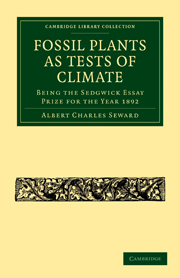Book contents
- Frontmatter
- PREFACE
- Contents
- Introduction
- Chapter I HISTORICAL SKETCH
- Chapter II PLANT DISTRIBUTION
- Chapter III PLANTS AND LOW TEMPERATURES: ARCTIC VEGETATION
- Chapter IV THE INFLUENCE OF EXTERNAL CONDITIONS UPON THE MACROSCOPIC AND MICROSCOPIC STRUCTURES OF PLANTS
- Chapter V ANNUAL RINGS IN RECENT AND FOSSIL PLANTS
- Chapter VI ARCTIC FOSSIL PLANTS
- Chapter VII CARBONIFEROUS PERIOD
- Chapter VIII PLEISTOCENE PLANTS AND CONCLUSION
- List of Works referred to in the Text
- Index
Introduction
Published online by Cambridge University Press: 07 September 2010
- Frontmatter
- PREFACE
- Contents
- Introduction
- Chapter I HISTORICAL SKETCH
- Chapter II PLANT DISTRIBUTION
- Chapter III PLANTS AND LOW TEMPERATURES: ARCTIC VEGETATION
- Chapter IV THE INFLUENCE OF EXTERNAL CONDITIONS UPON THE MACROSCOPIC AND MICROSCOPIC STRUCTURES OF PLANTS
- Chapter V ANNUAL RINGS IN RECENT AND FOSSIL PLANTS
- Chapter VI ARCTIC FOSSIL PLANTS
- Chapter VII CARBONIFEROUS PERIOD
- Chapter VIII PLEISTOCENE PLANTS AND CONCLUSION
- List of Works referred to in the Text
- Index
Summary
If we take up any work treating of fossil plants we shall generally find the difficulties of the subject emphasized and the disadvantages recounted under which the palæobotanist is placed as compared with the palæozoologist. The latter finds rich material preserved in media, and under conditions, in which fossil plants never occur. Animals too, from the nature of their organisation, are far better adapted for preservation in a fossil state than the more delicate and perishable structures of plants. In questions of geological chronology and correlation animals have generally been preferred to plants, both on account of their greater abundance in the stratified rocks, and because they have been considered safer guides. Bunbury, writing on the vexed question of Indian stratigraphy, remarked—“The palæobotanical evidence is far from unequivocal, and, such as it is, might be outweighed by the discovery of a single, well marked and thoroughly characteristic, fossil shell or coral.” This shews what little importance is attached, by some at any rate, to the correlative value of fossil plants.
Palæobotanists have for the most part expressed their confidence in plant evidence. We are not concerned, at present, with the defence of Palæobotany as a valuable aid to Palasozoology in stratigraphical geology, nor with supporting the opinion of some of the more sanguine that plants may indeed be more reliable tests of age than fossil animals.
- Type
- Chapter
- Information
- Fossil Plants as Tests of ClimateBeing the Sedgwick Essay Prize for the Year 1892, pp. ix - xiiPublisher: Cambridge University PressPrint publication year: 2009First published in: 1892



